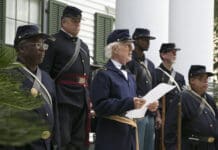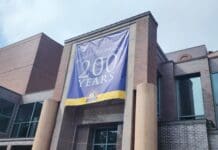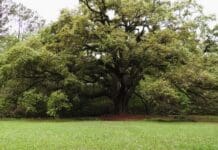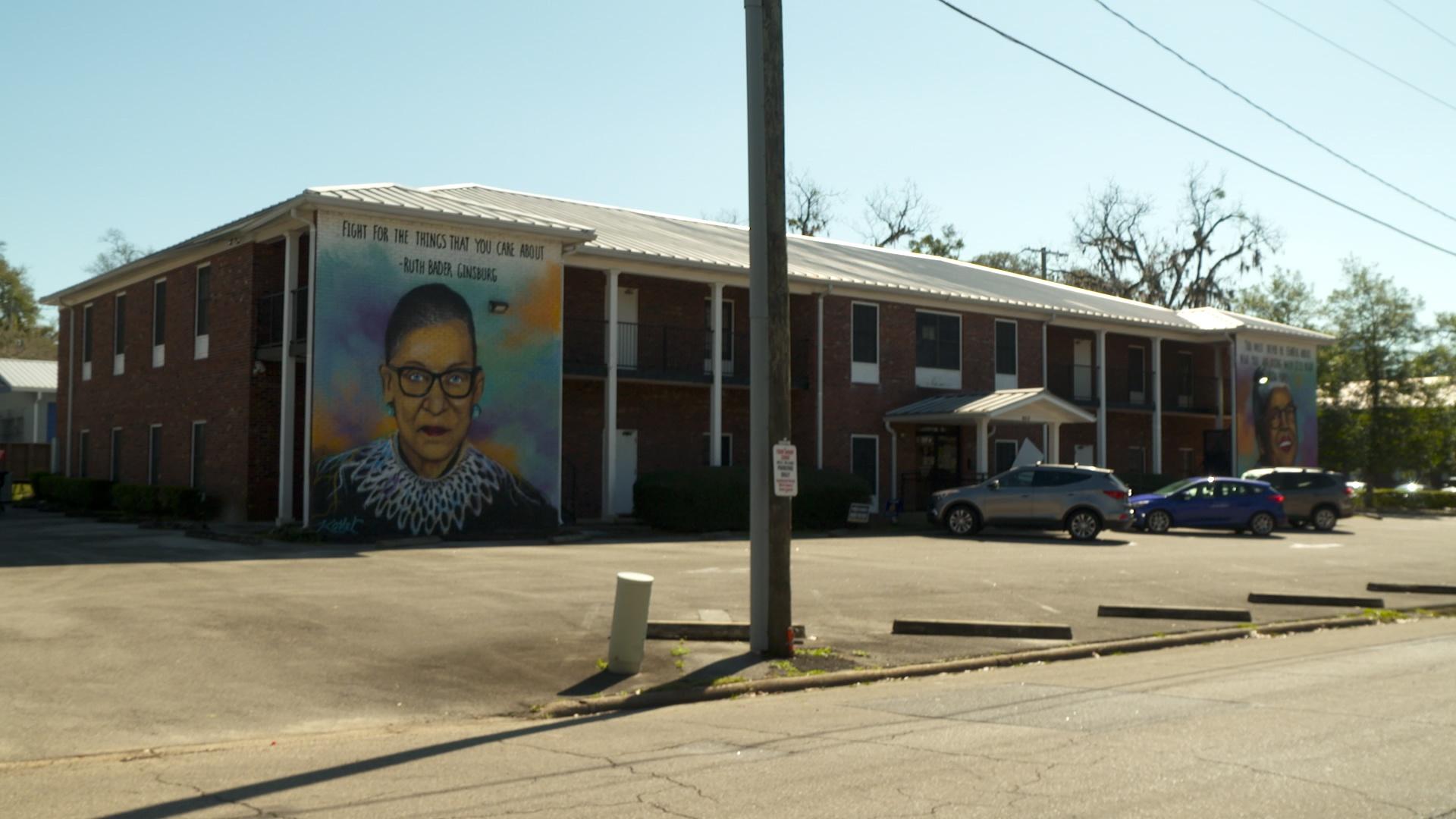

Local Routes takes a look inside the installation of murals of Ruth Bader Ginsburg and Rosa Parks at the Florida People’s Advocacy Center in Frenchtown, Tallahassee. This story explores the intersection of a local artist, an advocacy organization, and the continued revitalization of one of the oldest black neighborhoods in the state of Florida.


Anyone who has driven around Tallahassee has seen the beautiful murals that make up the city’s cultural landscape, but they may not know the face behind several of them. Kollet Hardeman is the muralist of many artworks around town, including Rosie the Riveter on Gaines Street, the Grace Mission Episcopal mural on Bronough, and the Tallahassee mural on FAMU Way.
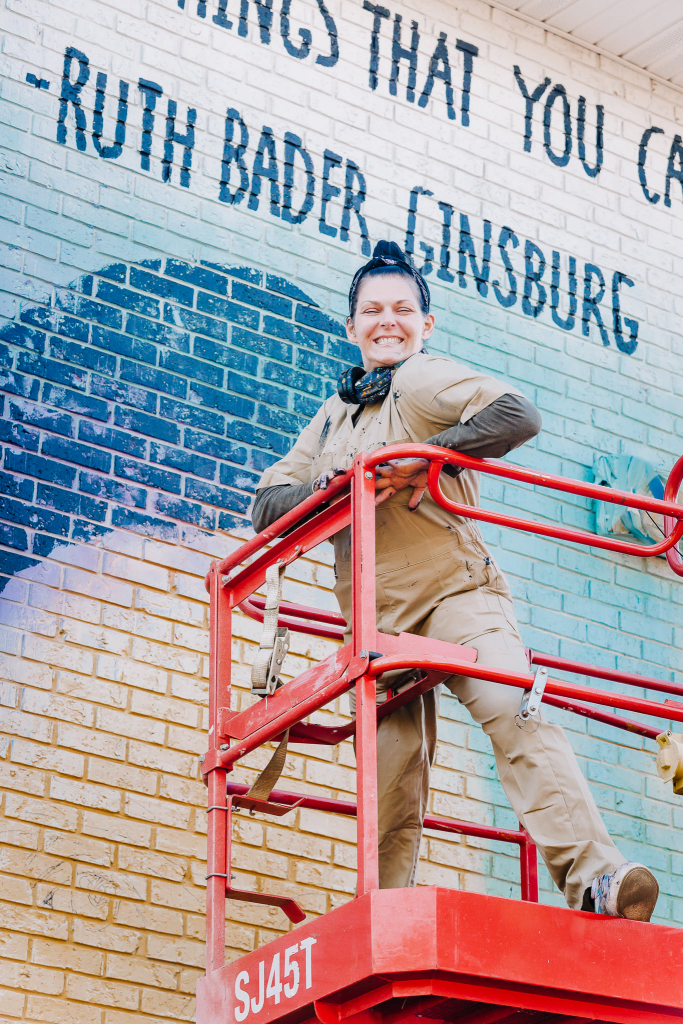

Hardeman recently moved from Tallahassee to Austin, Texas, but her most recent project brought her back to the Capital City in November 2020 to create two powerful murals on Martin Luther King, Jr. Boulevard in Frenchtown. The murals depict Supreme Court Justice Ruth Bader Ginsburg, who passed away last September, as well as legendary civil rights activist Rosa Parks. Hardeman designed the murals to be beautiful and inspiring, but they also tell a larger story about the collaboration of an artist, an advocacy organization, and the continued revitalization of one of the oldest black neighborhoods in the state of Florida.
Hardeman was approached by Jodi Wilkof, a Tallahasseean who serves as Chief of Staff to Leon County Commissioner Rick Minor. Wilkof asked Hardeman if she would create a mural of Justice Ginsburg shortly after her passing, and the pair found the perfect place.
An Advocacy Center in the Heart of Frenchtown
The murals live on the walls outside the Florida People’s Advocacy Center, often shortened to Florida PAC. Executive Director of the Center, Karen Woodall, says that play on the similar sounding abbreviation for “Political Action Committee” was intentional but intended to be distinctly different. She says that “instead of raising money for politicians, we’re raising voices to be part of the conversation and dialogue at the capitol.”
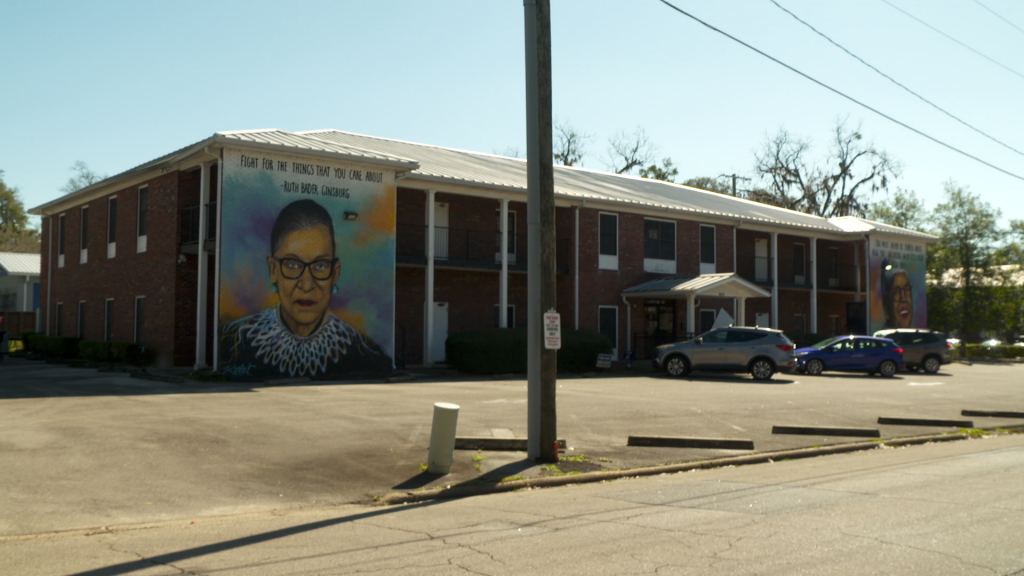

Woodall went on to explain that Florida PAC’s work uplifts the voices of many poverty based organizations throughout the state. “They don’t have a lot of money and when they do come to Tallahassee, the cost is prohibitive because they have to stay in hotels, they’ve got to rent buses or they come up for one day, not even a whole day and go back,” says Woodall. “We have rooms that people can stay when they come to Tallahassee to lobby.”
While the Florida PAC building seemed like the perfect spot for the new Ginsburg mural, there was the issue of symmetry. Since the Center is a shotgun-style building with two prominent walls, Woodall thought it best to include an African-American civil rights leader on the wall opposite Ginsburg’s mural. “I went door to door across the street and interviewed over at the farmers market and talked to folks there. Rosa Parks beat out Harriet Tubman by about two votes,” says Woodall.
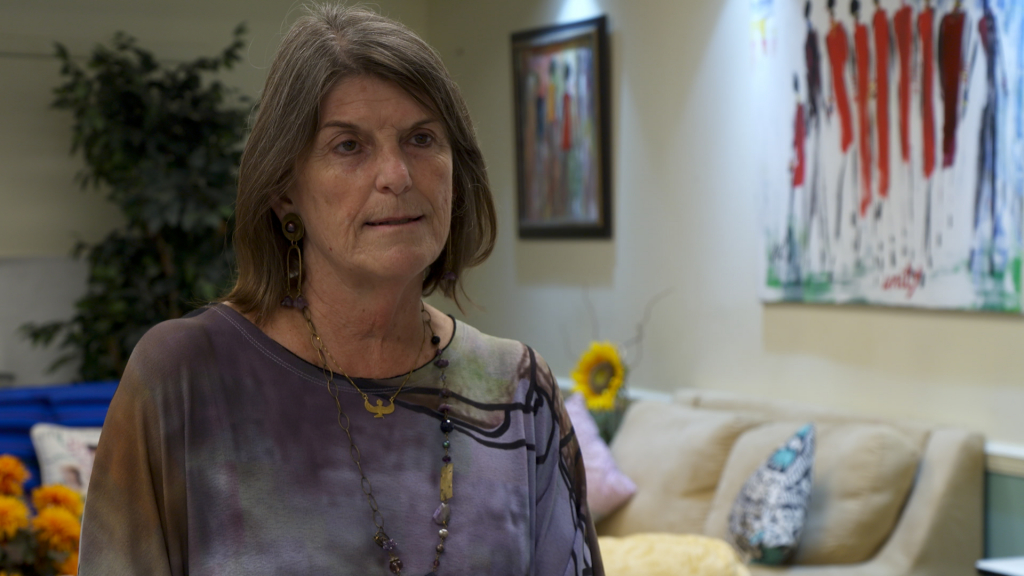

In addition to hosting advocacy groups, Florida PAC also hosts offices for organizations based in Tallahassee. Some of these offices include All Voting Is Local, Tallahassee Food Network, and the Frenchtown Revitalization Council. Miaisha Mitchell is Executive Director of that Revitalization Council. She sat down to chat with us about the Center and the murals. Mitchell believes that Parks and Ginsburg were perfect choices for the building’s most prominent walls. “It’s just a perfect place for me to do my work,” Mitchell says. “It is really a wonderful way to be placed in our community to talk about some of the great work these women have done with Judge Ginsburg and Mrs. Parks, excellent choice for people who want to do social justice work.” Woodall echoes this sentiment. “Both women in in their different ways and different roles are the embodiment of what we strive to do here at the center,” says Woodall. “Because we’re working for social and economic justice, we’re working for engagement, involvement, empowerment of the communities of color, people who are often left out, and so it was real appropriate for them to be on the building.”
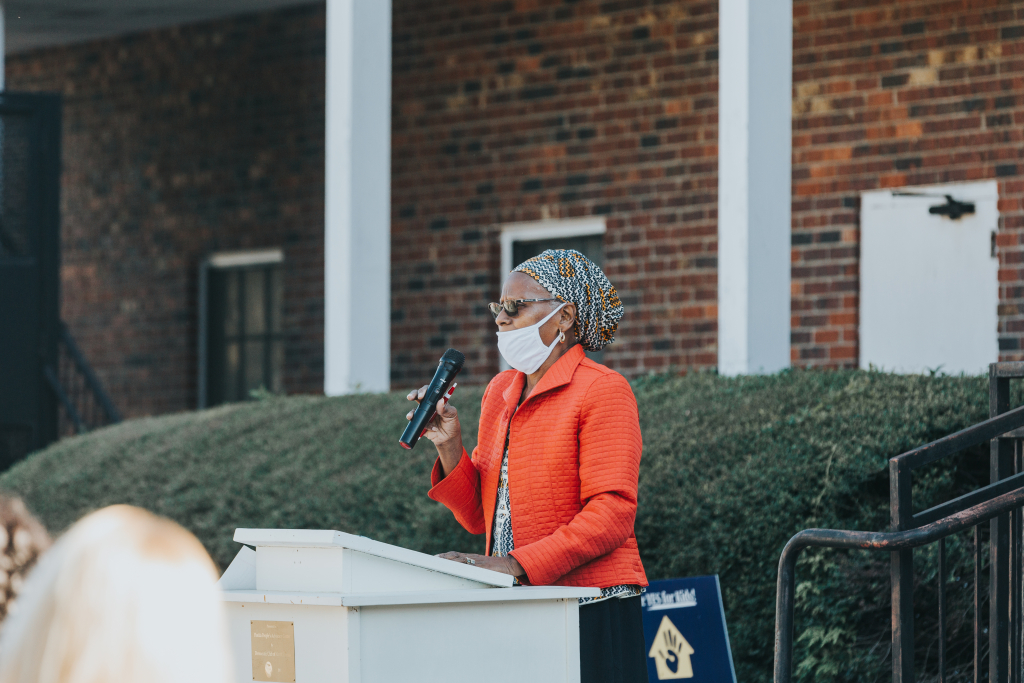

The Artistic Process
Any non muralist sees the work of a larger-than-life artwork and wonders how something of this scale is accomplished. Hardeman’s painting technique has developed over time, but she says it is rooted in the experience of watching her father and grandfather, who were both commercial painters. “I went to work with them and I learned how to paint walls and how to use a paint sprayer and roll and things like that. Conceptually how I apply that to a mural is I work from the back to the front. I layer it. So if for instance RBG and Rosa Parks had a white background, I would spray white here then jump over the next one and spray white there and then I would fade in the blue and then I fade in the blue, so I only touch a color one time and it cuts down and streamlines your process.”
Painting a mural might seem daunting to someone unaccustomed with the process, but even a seasoned muralist like Hardeman finds herself intimidated at the beginning. “Every time I walk up to a wall, a layer is pulled back on me,” Hardeman says. “There’s a very powerful moment when I walk up to any wall and it’s blank and it’s somebody’s million dollar property. It’s a ten thousand dollar fix if I mess it up. And it’s a blank wall and I put the first stroke on it and that overcoming of fear that happens with the very first part, at the end of the job I look back and I cry on every job.”
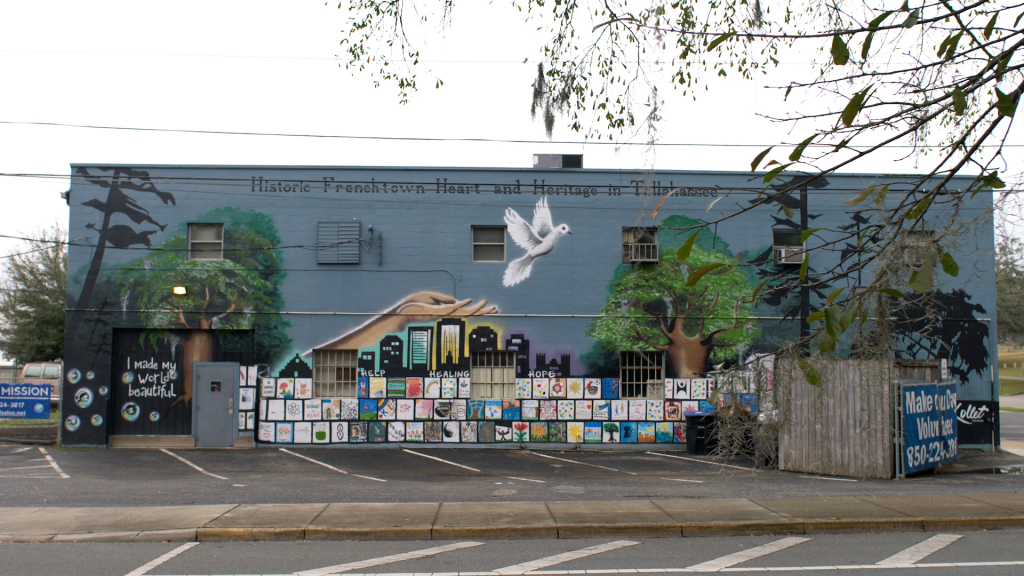

Education Through Street Art
Hardeman, Woodall, and Mitchell agree that these murals will serve to educate people, especially the younger generation, on our nation’s history. “Our younger generation is no longer looking in books,” says Hardeman. “If they want to learn something, they have to directly seek that query. And so the best way that I have found to teach the younger generation about our past and and everybody who helped get us to where we are right now is to put street art in their face.” Mitchell agrees, saying “I like the fact that we have these two great women so that our young people get to know people. They don’t know about Ruth Bader Ginsburg, many know about Rosa Parks, but they don’t know the story, the real stories behind their contributions. So [we’re] trying to educate them on history.”
Room For More Artwork
Though the murals of Ginsburg and Parks occupy prime real estate on the building’s exterior, both Woodall and Mitchell hope to pay homage to more influential African-American leaders in the future, putting them on display for members of the Frenchtown community as well as visitors to the Center. Of course, efforts to revitalize Frenchtown and bring more art to the community do not stop at the Florida PAC building. Local artist Annie Harris, well-known for her efforts to revitalize Frenchtown, holds ASH Gallery nearby the Florida PAC building. Her artwork already covers some interior walls of the Center, and her sidewalk art project nearby has brightened up the neighborhood. Harris’s most recent project is a gallery display at City Hall, left her unavailable to interview for this story. However, Hardeman, Woodall and Mitchell each mentioned her work and passion, and hope that the artistic movement she has created will encourage the community to take part and add their own creative touch to the landscape of Frenchtown. Miaisha Mitchell even sees room for children and families to become involved. “If you’re a burgeoning artist out there, you want to find out what you can do? Come this way,” Mitchell says. “We’ve got a space for you on the wall. We do hope that we can get parents engaged and some young people can actually begin to look at painting windows you know or painting the walls, doing their own murals.”

